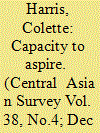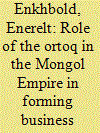|
|
|
Sort Order |
|
|
|
Items / Page
|
|
|
|
|
|
|
| Srl | Item |
| 1 |
ID:
169264


|
|
|
|
|
| Summary/Abstract |
Rather than studying young men's career- and/or economic-based aspirations, this article explores the obstacles that hinder youths of both sexes in gerontocratic southern Tajikistan and North India from developing the capacity to make their own life choices. Focusing mainly on the selection of marital partner and largely on women, I explore the narratives of those who have never even dreamed of a good life, of others who have dreamed but been unable to actualize their dreams, of a few who have started to plan the way forward, and of a tiny number who actually managed to achieve their aspirations, teasing out the influences that facilitate this. I suggest that even educated youths with some control over their public lives are constricted by their family relations and that it requires quite specific support to defy one’s family, which can create significant vulnerabilities in settings with no other safety net.
|
|
|
|
|
|
|
|
|
|
|
|
|
|
|
|
| 2 |
ID:
169263


|
|
|
|
|
| Summary/Abstract |
This study deals with the contemporary dynamics of urban life in Bishkek. Since the dissolution of the Soviet Union, Central Asian societies have experienced widespread political, economic and socio-cultural transformations. In this context, Western or globalized cultural modes and trends influence Kyrgyzstan's social and cultural life. One of these trends is the increasingly popular coffee culture, with its attendant high-grade coffee brands and fancy cafés changing established consumption patterns. This article focuses primarily on cafés as new places of consumption and communication, but it also examines the intentions and strategies of the café pioneers. We reflect on the emergence of coffee and cafés in Bishkek and show how they have integrated in urban life as ‘third places’. Coffee is breaking away from its commonly soluble form and moving toward an expensive lifestyle product, while the new cafés offer a place for communication that has not existed before.
|
|
|
|
|
|
|
|
|
|
|
|
|
|
|
|
| 3 |
ID:
169267


|
|
|
|
|
| Summary/Abstract |
This study investigates oasis expansion in the precolonial period and agricultural evolution in the colonial period using village-level statistics from the early twentieth century. This survey illustrates that the Kokand oasis in the Ferghana Valley initially appeared in the central part, where the Sart population settled by the seventeenth century. In the eighteenth and nineteenth centuries, the Uzbek and Karakalpak tribes migrated to the valley peripheries, while the Kyrgyz semi-nomads settled in the alluvial fan. It is not surprising that such a migratory process created a mosaic-like ethnic distribution. Furthermore, this study suggests that the pattern coincided with a variety of agricultural practices, and presents two contrasting models of cotton monoculture under the Russian Empire. The main area occupied by the Sarts presents a general model of canal-irrigated cotton planting in Central Asia, while the Karakalpaks’ cotton planting using groundwater in the periphery suggests multiple courses of nomad sedentarization.
|
|
|
|
|
|
|
|
|
|
|
|
|
|
|
|
| 4 |
ID:
169269


|
|
|
|
|
| Summary/Abstract |
The Abdālī Afghans-Pashtuns played a leading role in the creation of the Durrānī polity (est. 1747) – the precursor of present-day Afghanistan. Given their lasting contributions to the process of state formation in Central Asia, it is somewhat surprising that the early history of the Abdālī remains obscure. Nevertheless, authors of recent generations have not been deterred from speculating on the origins of the Abdālī. This article explores the prevailing theories concerning Abdālī prehistory, including the tribe’s purported connection to both the Hephthalites and the Sufi saint Abū Aḥmad Abdāl, as well as some of the motivations undergirding these theories. It also considers the place of the Abdālī within the Afghan-Pashtun tribal system and ventures to reconcile their Afghan identity with their alleged non-Afghan origins. The present study thus aims to offer a more nuanced understanding of the history of the Abdālī – the most politically prominent group in Afghanistan’s history.
|
|
|
|
|
|
|
|
|
|
|
|
|
|
|
|
| 5 |
ID:
169268


|
|
|
|
|
| Summary/Abstract |
This study investigates the emergence and development of business partnerships established by the Mongols and their merchant partners, ortoqs, in the Middle Ages. Ortoqs are known to have conducted trade and money-lending with the capital invested by their partners. This study shows that the contractual arrangements of Mongol–ortoq partnerships closely resembled medieval partnership contracts, such as mudharaba, inan, societas and commenda. Sophisticated concepts of liability in relation to investments and loans were developed in Mongol–ortoq partnerships, promoting trade and investment to facilitate the commercial integration of the Mongol Empire.
|
|
|
|
|
|
|
|
|
|
|
|
|
|
|
|
| 6 |
ID:
169265


|
|
|
|
|
| Summary/Abstract |
The ‘Sinicization’ of the Uyghur world – that is, the pervasive progression of Chinese influence into it – is a familiar topic of both Uyghur complaint and academic writing on Xinjiang. In this article, I discuss the striking appearance of this same motif in reference to the Sinicization of the physical Uyghur body, and use this example to argue that the communally enforced moral separation of the Uyghur from the Chinese, and the particular understanding of history that underpins this, have epistemological consequences for how the Uyghur people see themselves and the world.
|
|
|
|
|
|
|
|
|
|
|
|
|
|
|
|
| 7 |
ID:
169266


|
|
|
|
|
| Summary/Abstract |
The study focuses on the institution of boarding schools (Russian: internat) in Soviet Tajikistan in the 1950s and 1960s and its role in the education and training of the new national generations of skilled professionals in the fields of industry, science, culture, art and healthcare, which in turn contributed to the development of their country. Along with the de-Stalinization of education and subsequent polytechnization, as well as flexibility in the use of Soviet institutions, the internats were transformed from a purely Soviet project into a more inclusive Soviet-Tajik project at the national level for the training of new young national-Sovietized professionals. These professionals combined the qualities of Sovietized and local (national), with their distinctive norms, traditions and values, into a totally new form. The boarding school system turned into a factory for bringing up national-Sovietized specialists and cadres.
|
|
|
|
|
|
|
|
|
|
|
|
|
|
|
|
|
|
|
|
|